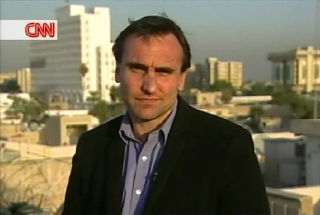CNN/I: Obama's War in Iraq

Length: 4:25
LARGE (51.5 MB) ----- SMALL (5.4 MB)
This is a remarkable prepared piece that has not yet aired on Domestic, although it was in "heavy rotation" on International and also posted at CNN.com -- a reality check about the war that P-E Obama is inheriting from the Bush administration, one that will involve less combat action but far more clandestine fighting between the US and Iran over ultimate control of Iraq.
This is such an important piece that I did a transcript of it myself. (Although hopefully Domestic will start airing it soon!)
MICHAEL WARE (voice-over): After too many years of this... America's president-elect has vowed to make it stop.
BARACK OBAMA, U.S. PRESIDENT-ELECT (video clip): As president, I will end this war.
WARE (voice-over): But how much of a war is there left for the president-elect to end? Under the Bush administration's new deal with Baghdad, much of America's ability to wage war in Iraq has already been surrendered.
LT. GEN. LLOYD AUSTIN, U.S. ARMY: We won't -- we don't plan on conducting unilateral operations in the future.
WARE (voice-over): For America's second-highest commander in Iraq, Lieutenant General Lloyd Austin, it's clear that when SOFA -- the Status of Forces Agreement -- activates on New Year's Day, America will no longer be leading the fight.
AUSTIN: It is their country, and they have the ultimate call on how operations -- the direction that we'll take in proceeding.
WARE (voice-over): A direction that will ultimately look like this... This is a state-sponsored Iraqi ad. A young boy bewildered as an American column disappears into the desert, leaving Iraq for good.
And until that departure, says the chairman of Iraq's equal to the Armed Services Committee, U.S. troops will take a backseat. "It is normal that Iraq is in the driver's seat, and with Iraq taking over internal security," he says, "America must play a supporting role."
But beyond the combat, there may be another war yet the Obama administration is forced to fight, one that Iraq's Sunni vice-president says is already underway.
TAREQ AL-HASHEMI, IRAQI VICE-PRESIDENT: Yes, I think so. I think it's already a spy war, in fact.
WARE (voice-over): He and U.S. intelligence officers say that war is being contested between American and Iranian agents. It's waged in Baghdad between two rival intelligence agencies -- one in this fortress-like building, funded and trained by the CIA; the other, according to U.S. and Iraqi intelligence sources, funded and trained by Iran.
(on camera) And their war is a hot one, according to intelligence sources, with agents -- all technically working for the Iraqi government -- dying on both sides.
(voice-over) And there's nothing in Washington's new deal to address that, prompting concern among Western diplomats over the fate of Iraq's official intelligence service, the one run by the CIA. Already Iraq's Sunni vice-president has called for the Iranian-trained agency -- called the Ministry of State for National Security -- to be completely disbanded.
But that's unlikely to happen. Iraq's Armed Services Committee Chairman, a Shia, believes both agencies will be under Baghdad's control, with much less of a CIA role. "I believe the relationship with the CIA will be gradually decreasing," he says, "though that doesn't mean there won't be a relationship at all."
With U.S. forces soon to be restricted, the spy game appears to be rising. Diplomatic and intelligence sources confirm U.S. soldiers recently arrested dozens of officers from the Iranian-trained agency. With no comment from American or Iraqi officials, the U.S. military's charges against the men are unknown, though Vice President Hashemi suspects it's part of a wider U.S. operation.
AL-HASHEMI: I know that the Americans are very much keen to clean up all our Ministries from any sort of direct connection to Iran.
WARE (voice-over): And with allegations Iraq's Shia prime minister is building new illegal militias, like this one, for his own -- a claim he vehemently denies -- the potential for more conflict persists.
So despite the Bush administration that started this war signing the deal to end it, the questions remain: what was the point, and is the conflict being left behind for President-elect Obama still to fight?
Michael Ware, CNN, Baghdad.
